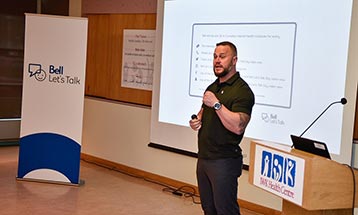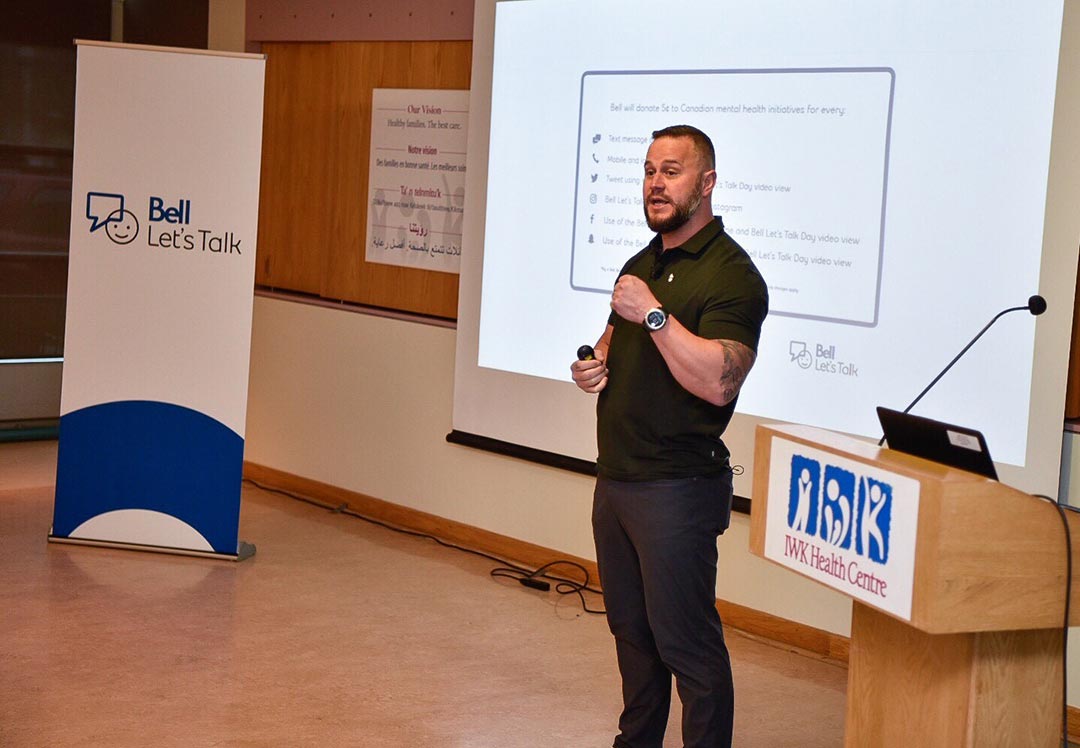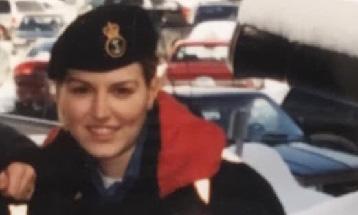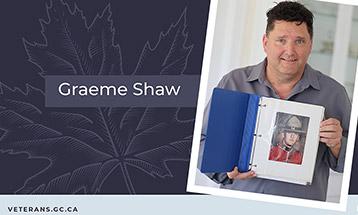“Being in the CAF becomes your identity. They break you down and build you back up. It’s a good thing, but when you leave, your identity doesn’t match the community you find yourself in anymore.”
Bruno Guevremont is a man who knows how to adapt to change. He had two distinct roles, serving separate tours in Afghanistan with two different branches in the Canadian Armed Forces (CAF). After releasing from service, he learned new skills to be able to pivot to new roles more than once.
Now, he’s sharing what he has learned about achieving goals in life after service with other Veterans and serving CAF members. He also coaches business leaders and employers on how to build teams and empower the best in their employees.
Bruno’s story
Born in Gatineau, Quebec, Bruno joined the CAF in 1999. He trained at CFB Borden as a weapons technician, and was then assigned to the Royal Canadian Regiment, 3rd Battalion. This unit deployed to Camp Julien in Afghanistan in 2003.
After he returned to Canada from Afghanistan in 2009, Bruno decided to try something new. He transferred to the Navy to become a Clearance Diver. These are highly-trained specialists who perform underwater demolition, salvage, repair and rescue—and dismantle explosives.
After three years training in demolitions, Bruno returned to Afghanistan and put these skills to use. The day his unit arrived in Kandahar, Bruno went to work with the team investigating a bombing in a crowded market in front of the governor’s palace.
Bruno describes this tour as “an intense time.” Over a seven-and-a-half month period, he was a part of several post-blast investigations near allied forces bases, and civilian sites like schools and markets. “There was a lot of gore,” he recalls. During his time there, he dismantled over 100 improvised explosive devices, and is the only CAF member to have dismantled a live suicide bomb.
Near the end of his tour, Bruno began experiencing symptoms of post-traumatic stress disorder. After returning to Canada, he was diagnosed with PTSD and sought treatment. As part of his process to recover, he worked out daily in the base gym. “A lot of other people in the base started working out along with me,” he recalls.
Carrying skills into life after service
After releasing from this military in 2014, Bruno settled in Victoria, BC. Here, he opened a gym—CrossFit Stasis—which allowed Veterans a year’s membership for free.
In 2016, he served as Captain for Canada’s Invictus Games team, and was also a Bell Canada Let’s Talk Ambassador for mental health. He travelled across the county to talk to Veterans groups about mental health and finding a new path after service.
In 2019, he became a coach and trainer helping business leaders optimize their effectiveness and began speaking with Veterans groups to help connect Veterans with employers.
He began this new career with a cross-country speaking tour, including a journey to the North Pole with the True Patriot Love Foundation. He has spoken to a wide range of audiences on topics such as team building, health and wellness, work-life balance, post-traumatic stress and resolving workplace conflict. He even spent time working for and touring with motivational speaker Tony Robbins.
In 2019, he also trained in Transcendental Meditation, a simple mental technique that teaches practitioners how to settle their minds and their bodies, and reinforce the mind-body connection. “I did lots of research into different ways to care for your mental health, and I read that meditation can be good for you,” he recalls. “After meditation, I feel so chill, so incredibly peaceful. It helps you achieve a position of wellness, so that you can make the right decisions in life for yourself,” says Bruno.
What he learned
The biggest challenge for many Veterans, Bruno believes, is “knowing what’s out there—all the services and benefits available to you, and finding them while you are re-forming your new identity outside the military community.”
“A lot of Veterans don’t know whom to call for services, or even that a service might exist,” he says. The transition “is a big step to take,” and there are many things requiring the Veteran’s attention all at once.
“In the military, there are lots of people around to take care of you: cooks, doctors, therapists and so on. But after transition, you have to find all those things yourself. You also have to learn new skills, and we often forget that we have the ability to learn new skills.”
“Every day, I’m on a phone call with a Veteran who tells me, ‘I’ve tried everything and nothing works.’ So I ask, ‘Did you try working out? Equestrian therapy? Fishing? Transcendental meditation?’ And the answer is often no.”
While there are great services and programs available to Veterans, sometimes people just don’t know about them. His best advice: “To stay healthy, everyone needs purpose and physical activity that works for them. So, figure out your purpose. What do you want in life after service? What do you need to get it? How will you know when you have it?”
Find out about all the different programs, benefits and services that are available, either through VAC or other organizations. And keep trying new things. “Don’t give up on finding what you need if the first thing doesn’t work.”
Bruno is still working on his way forward after service. Always being willing to learn new skills helps him adapt to the changes that will keep coming.
Not sure what programs, services and benefits are available for you? Find information about programs and services.




